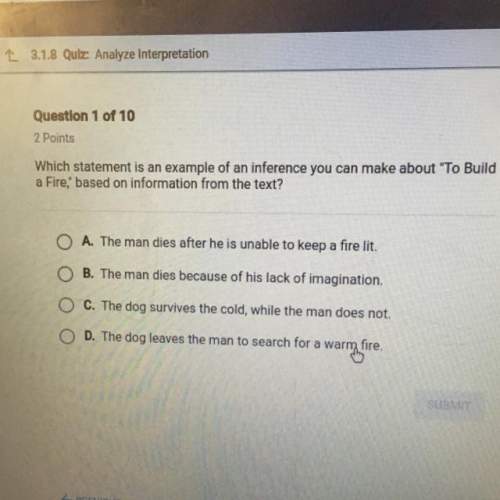
English, 12.06.2020 21:57 needhelpwithHW10
4. In the context of this story, how do some people face death? Was Martha's approach
for dealing with her dying daughter the right approach? Was it helpful? Harmful?
How? Cite evidence from this text, your own experience, and other literature, art, or
history in your answer.

Answers: 3


Another question on English

English, 21.06.2019 17:10
Read the excerpt from "doc rabbit, bruh fox, and tar baby" from the people could fly that was the way bruh fox found him. doc rabbit was stuck in tar baby. bruh fox got him loose, "what must i do with you? " bruh fox said. he led rabbit along to the house they were buildin. "you the one drank up my crock of cream. i didn't get one taste. . " which best describes the message of this fable
Answers: 1

English, 21.06.2019 21:40
4.in those days the church was not merely a thermometer that recorded the ideas and principles of popular opinion; it was a thermostat that transformed the mores of society. •type of figurative language: •meaning of figurative language: •effect on tone and mood: •effect on audience: choose out of these: hyperbole, irony, historical question, paradox, allusion,metaphor,personification,symbolism and simile
Answers: 3

English, 22.06.2019 00:30
Read the excerpt from the odyssey; 'o cyclops! would you feast on my companions? puny am i, in a caveman's hands? how do you like the beating that we gave you, you d(arn)ed cannibal? eater of guests under your roof! zeus and the gods have paid you! ' according to this excerpt, odysseus (a)is fearful of the cyclops. (b)is prideful and overly confident. (c)has been weakened by the cyclops. (d)has regrets about staying on the island.
Answers: 2

English, 22.06.2019 01:00
Read the excerpt from act 1 of a doll's house. helmer: nora! [goes up to her and takes her playfully by the ear.] the same little featherhead! suppose, now, that i borrowed fifty pounds today, and you spent it all in the christmas week, and then on new year's eve a slate fell on my head and killed me, and— nora: [putting her hands over his mouth]. oh! don't say such horrid things. helmer: still, suppose that happened, —what then? nora: if that were to happen, i don't suppose i should care whether i owed money or not. helmer: yes, but what about the people who had lent it? nora: they? who would bother about them? i should not know who they were. helmer: that is like a woman! but seriously, nora, you know what i think about that. no debt, no borrowing. there can be no freedom or beauty about a home life that depends on borrowing and debt. we two have kept bravely on the straight road so far, and we will go on the same way for the short time longer that there need be any struggle. nora: [moving towards the stove]. as you , torvald. how does the interaction between helmer and nora advance the plot? nora realizes that helmer will completely disapprove of her having borrowed money, so she has to continue to keep it a secret from him. nora realizes that she and helmer have the same ideas about financial issues, and the conversation brings them closer together later in the play. helmer realizes that nora is more responsible with money than he originally thought, and he trusts her more with finances later in the play. nora realizes that helmer knows a lot more about borrowing and lending, and she will seek his input later when she needs it.
Answers: 1
You know the right answer?
4. In the context of this story, how do some people face death? Was Martha's approach
for dealing w...
Questions

Mathematics, 02.07.2019 05:00

English, 02.07.2019 05:00

Mathematics, 02.07.2019 05:00





Spanish, 02.07.2019 05:00


Chemistry, 02.07.2019 05:00

Business, 02.07.2019 05:00

Chemistry, 02.07.2019 05:00






Mathematics, 02.07.2019 05:00

Social Studies, 02.07.2019 05:00




